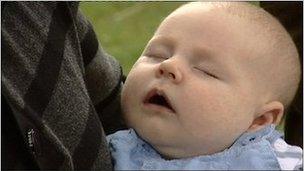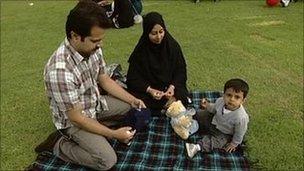Born in Bradford study targets child health issues
- Published

The Teddy Bears' Picnic in Lister Park is an annual event for the Born in Bradford families
In Bradford's Lister Park, hundreds of families are getting ready for a summer picnic.
On the grass next to the Edwardian splendour of the Cartwright Hall art gallery they lay out their picnic rugs under a sunny West Yorkshire sky.
But these are no ordinary families.
For this is the annual Teddy Bears' Picnic for families taking part in one of the country's biggest research projects, studying the health of around 14,000 children born in the city.
It is an attempt to get to the bottom of why illness blights the lives of so many families in Bradford, which is home to some of the most deprived communities in the UK.
Blood samples
Between 1996 and 2003, the number of children dying in Bradford before they reached their first birthday was almost double the average for England and Wales.
Levels of childhood illness are higher as well, along with much higher rates of heart disease, diabetes, cancer, obesity, asthma and eczema in the city's population as a whole.

Jacob Robinson, the youngest and final recruit to the Born in Bradford project, takes a well-earned snooze
So the project, known as Born in Bradford, is looking at every aspect of a child's development to try to get an idea of how factors like environment, education, diet, ethnicity and genes interact together to affect our health.
Since March 2007, every pregnant woman who attended the Royal Bradford Infirmary has been asked to take part and - amazingly - nearly nine out of 10 said yes.
Parents give blood and saliva samples, babies are measured and weighed and their progress will be tracked across the years.
Future health
Making his first appearance at this year's picnic is Jacob Robinson, born at the beginning of June to Nicola and Duncan.
Jacob is the last recruit to the study and his parents are thrilled to be taking part.
"I just think it is an incredible study," says Nicola.
"The fact they are speaking to so many mums across the whole area and compiling all of the data and using it for the future health of babies, I just thought it was a really important study so I was quite excited to be involved."
By lunchtime, more than a thousand people have gathered in the park where stalls promote everything from the Bradford Bulls rugby league side to how to practise good teeth-cleaning.
At the centre of it all, chatting to parents and children, is Professor John Wright, the man in charge of the project.
"Bradford's got some major health problems. We have some of the highest infant mortality rates in the country, we have high levels of childhood asthma, childhood obesity, and we have a diabetes epidemic that is happening in this city as we talk.
"So what we wanted to do was to set up a study to understand what the causes of this were and in particular the early origins of these diseases, as they track through to adulthood.
Ethnic diversity
"The more we understand about adult health the more we understand how important the early origins of illness are.

Ali and Battul Agha and their youngest son Rayan are taking part in the project
"There is particular interest in the first origins of early development of disease - in the womb and the first couple of years of life - and these seem to predict who gets sick later on in life."
The Born in Bradford families reflect the city's ethnic diversity and around half of them are from an Asian background, a community that has some distinct health problems.
For example, around a quarter of Asian adults in Bradford are diabetic, while another quarter are pre-diabetic, putting them at high risk of developing the disease.
Battul Agha is one mother for whom diabetes is a serious worry.
Her son Rayan is one of the Born in Bradford children, but his mum says diabetes has already affected the family.
"I had gestational diabetes while I was pregnant but generations have got it - my children's grandparents, my own grandparents, my mum, some uncles have even developed it.
"So therefore we are particularly cautious about the children's health and what we feed them. We try and give them as much exercise as we can - lots of outdoor time and a healthy lifestyle."
So now the last families have been recruited, the hard work for the researchers begins.
Over the coming years they will track lives of thousands of children across Bradford and hope to provide some clues about the illnesses that affect many more millions of adults.
- Published15 August 2010
- Published29 June 2011
- Published18 March 2011